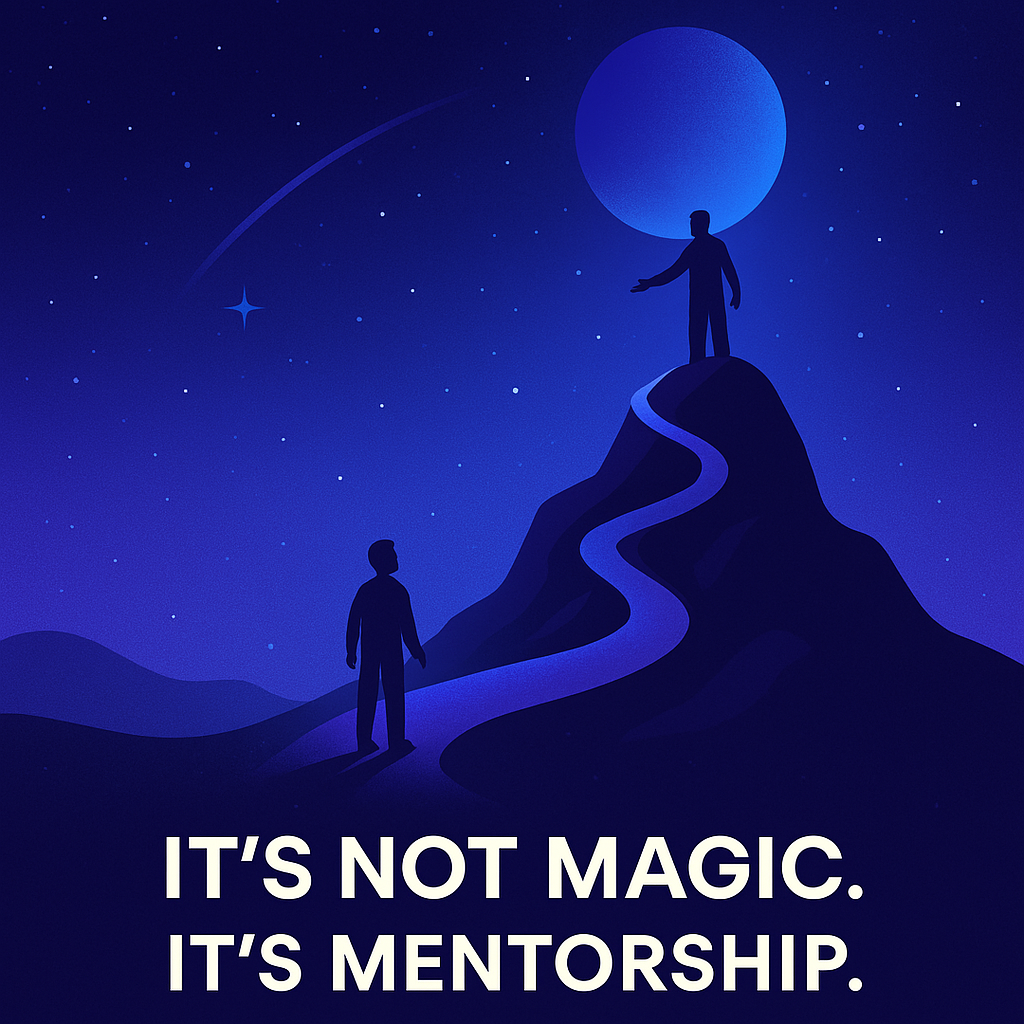
Cybersecurity Is a Maze, not a Ladder.
Cybersecurity is one of the most exciting and rewarding fields out there, but it’s also one of the most overwhelming. If you’re just starting out, it feels like standing at the base of a mountain with no map, no gear, and a dozen voices shouting from the top, each telling you to take a different path.
Certifications. YouTube. LinkedIn gurus. Bootcamps. Reddit threads. Lab after lab after lab. It’s easy to feel like you’re doing a lot, without actually getting anywhere.
And here’s the hard truth: most people waste a lot of time in the early stages. Not because they’re not smart. Not because they’re not trying. But because they’re moving without direction.
That’s where mentorship comes in, and it’s why I believe mentoring is the most underrated shortcut in cybersecurity.

In most industries, there’s a clear path, you go to school, you get a degree, you apply for jobs, you start junior, you move up. Easy enough. But in cybersecurity? There are so many paths, and none of them are “one-size-fits-all.”
You’ve got:
• Penetration testing
• Governance, Risk & Compliance (GRC)
• Incident response
• Threat intelligence
• Security engineering
• Blue teaming, red teaming, purple teaming
• SOC analysis
... and that’s not even the full list.
So what do most beginners do?
They try to learn everything. They buy every course. They try to do blue team and red team at the same time. They aim for OSCP before they even know how a TCP handshake works.
But if there’s one thing I’ve learned, both through my own journey and through mentoring others that you don’t need to know everything. You need to know the right things, at the right time, in the right order.
And that’s exactly what a mentor helps you do.
Mentoring Can Collapse Your Learning Curve

Imagine this:
You’re driving through a city you’ve never been to before. No GPS. Just street signs in a language you barely understand. Every turn you make feel like a guess. You might get to your destination eventually... but it’ll take hours.
Now imagine you’ve got someone sitting next to you who knows the city inside out. They tell you when to turn, where the traffic is, which shortcut avoids the construction.
Same car. Same city. But now? You get there in 30 minutes.
That’s mentorship.
You still have to drive.
You still have to show up and do the work.
But you’re not wasting energy on the wrong turns anymore.
My Journey in Mentorship

Over the last few years, I’ve worked with people across the entire age spectrum, from teenagers who are just getting started, to mid-career professionals making a pivot, to people in their 50s exploring cybersecurity as a second career.
And you know what? The age never mattered.
The 16-year-old was hungry, fast, and curious.
The 50-year-old brought decades of life experience, focus, and discipline.
Both had something valuable, and more importantly, both of them had a reason for doing this.
Here’s the thing most people miss: Mentorship is not about who’s younger or older. It’s about who has walked the path and who wants to walk it faster.
If you’re ahead, you guide. If you’re behind, you learn. Simple as that.
What a Mentor Actually Does for You

Mentoring is about helping someone see clearly. And sometimes, that means:
- Asking hard questions that force you to rethink your approach.
- Telling you to stop wasting time on a tool that’s not relevant to your goal.
- Helping you focus on what employers are looking for, not just what’s trending on YouTube.
- Reviewing your resume in a way that highlights real strengths, not just buzzwords.
- Challenging your assumptions and building your confidence.
I’ve had mentees go from zero experience to landing real roles. Not because they were “geniuses,” but because they committed to a strategy, stayed consistent, and had someone in their corner who gave honest feedback.
Why Mentorship Works (Even If You're Self-Taught)

You might be thinking: “But I learn fine on my own.”
That’s great. Honestly, being self-taught is a huge asset in cybersecurity. But even the best self-learners hit walls. They lose momentum. They chase shiny objects. They build skills with no context.
A mentor gives you:
- Accountability: Someone who actually notices if you stop showing up
- Structure: A roadmap, not just a random collection of videos and PDFs
- Feedback: Real talk on where you’re strong, and where you need work
- Perspective: Someone who can say, “Here’s how this plays out in a real job”
And if you’re trying to stand out in a competitive industry? Those things matter more than you think
What Mentorship is NOT

Let's be clear that mentorship is not a shortcut where someone gives you all the answers. It’s not some cheat code that replaces the hard work. If anything, a good mentor will challenge you more, not less, because they want to see you grow, not coast. It’s also not about handholding. You still have to drive. You still have to wake up, put in the hours, do the labs, and wrestle with the concepts. A mentor doesn’t walk the path for you, they just help you avoid wasting time on the wrong one. And finally, mentorship is not a one-sided relationship. It’s not just about taking advice and saying thanks. The best mentees engage, they ask thoughtful questions, follow through on action items, and sometimes even inspire the mentor in return. When it’s done right, both sides grow. If you’re ready to show up, stay consistent, and stay coachable, mentorship can be one of the most powerful accelerators on your journey.
Final Thoughts: Don’t Try to Do It All Alone

If you’re serious about making progress in cybersecurity, here’s my honest advice: Don’t go alone.
- There’s no trophy for struggling in silence.
- No extra credit for figuring it out the hard way.
The goal is to grow, to move forward, and to become the best version of yourself without wasting years trying to reinvent the wheel. Mentorship doesn’t guarantee success. But it gives you a massive advantage, one I wish more people knew about.
So, find a mentor. Learn from their experience, skip a few detours, and accelerate your journey. Your future self will be glad you did.







